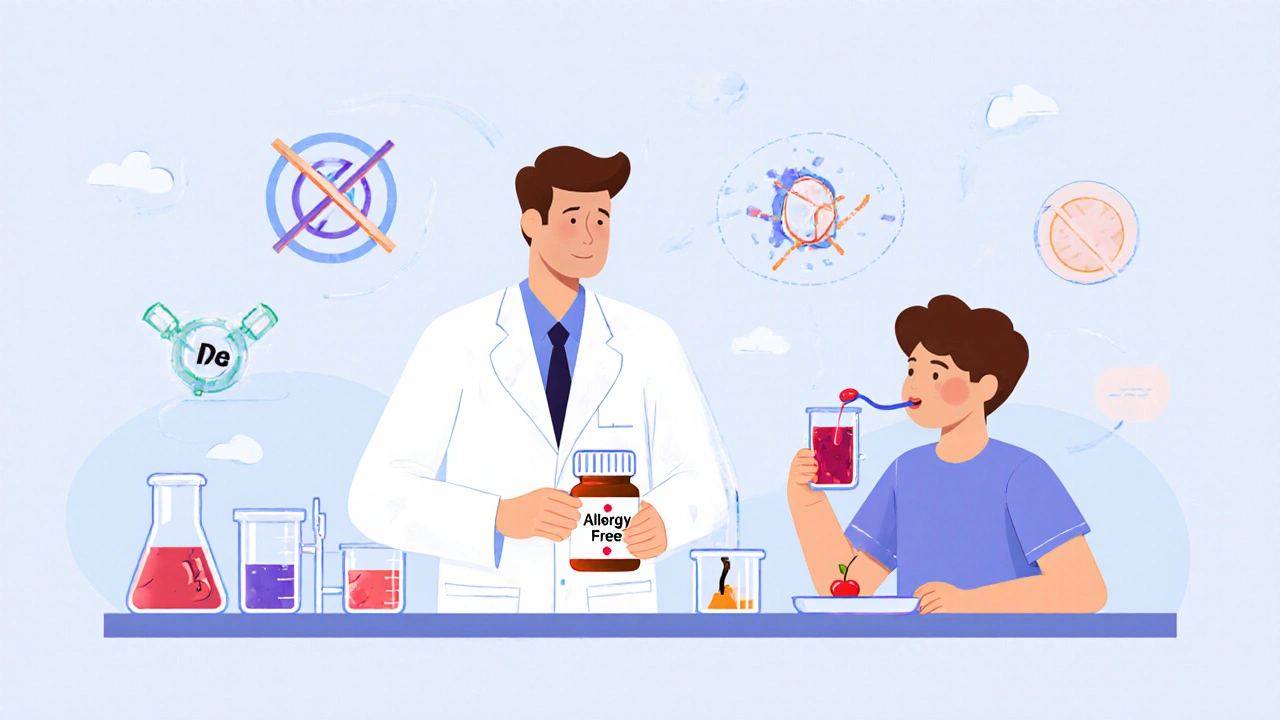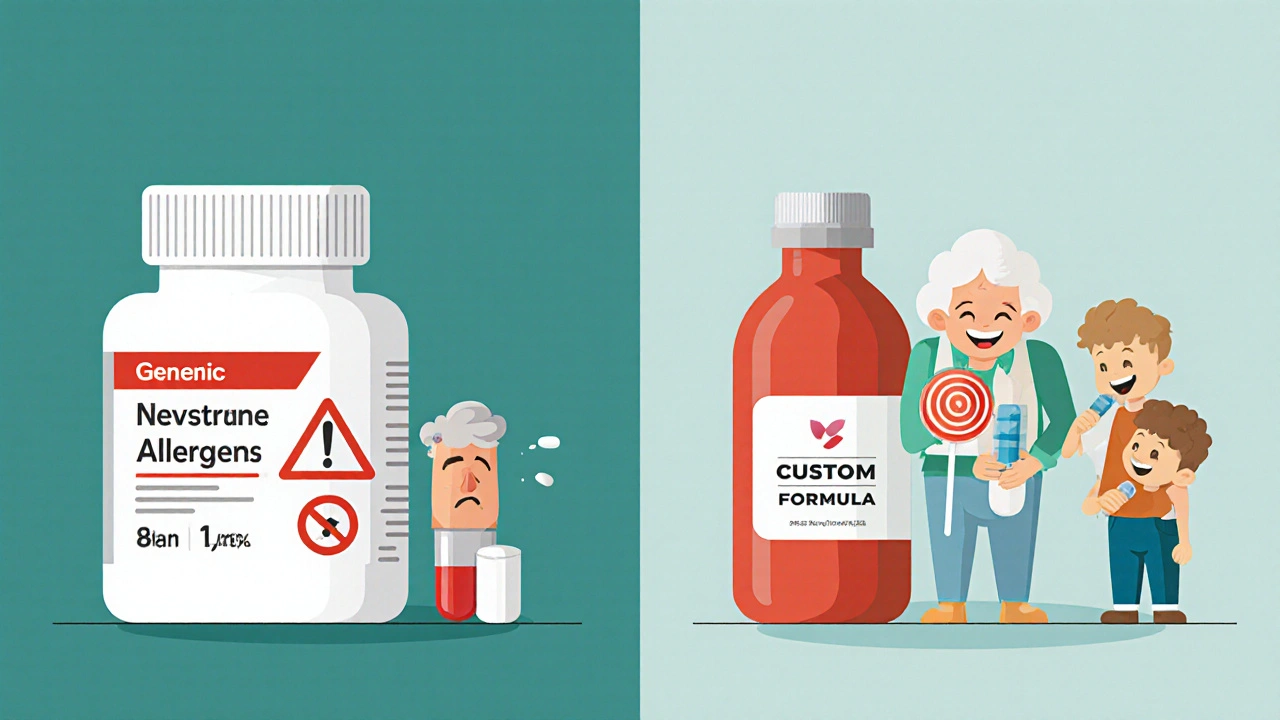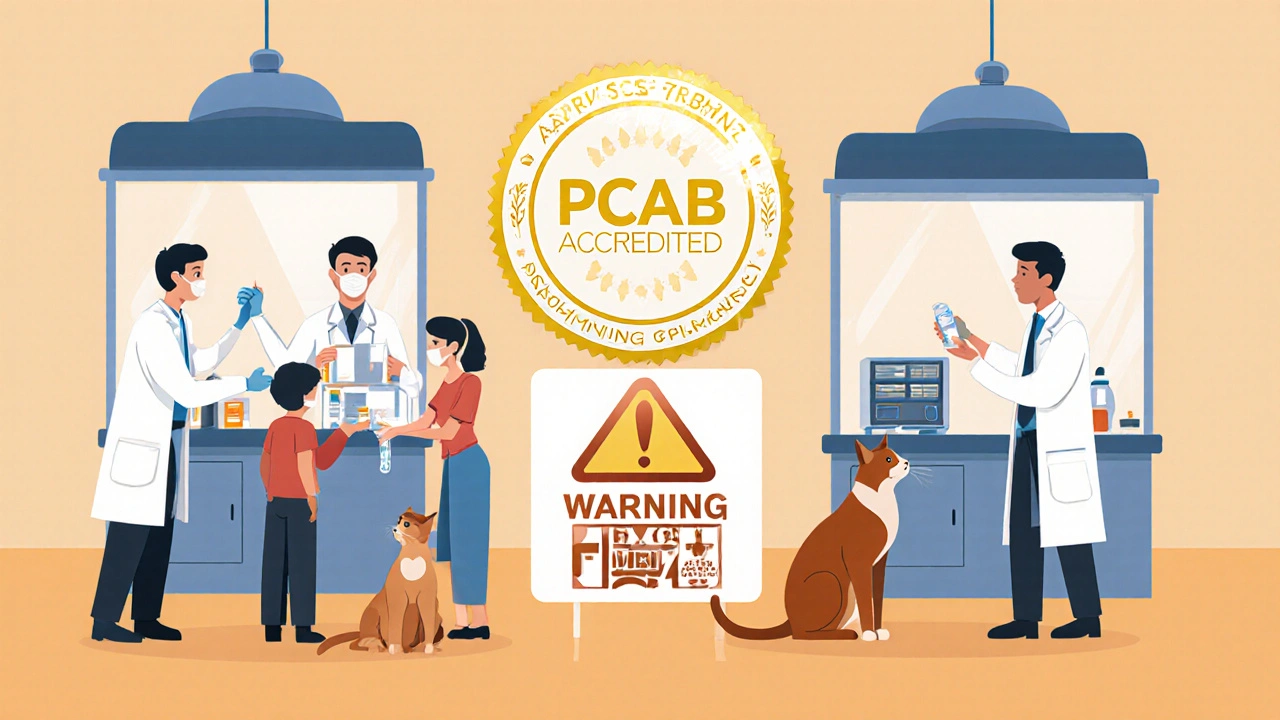Compounded Medications: When Custom Formulas Are Needed

Most people assume their prescriptions come in standard pills or capsules from big drug companies. But what if your body can’t handle those? What if you’re allergic to the dye in the pill, can’t swallow tablets, or need a dose that doesn’t exist on any pharmacy shelf? That’s where compounded medications come in.
What Exactly Is a Compounded Medication?
A compounded medication is made by a pharmacist who mixes ingredients from scratch to match a patient’s exact needs. It’s not mass-produced. It’s custom-built. Think of it like ordering a tailor-made suit instead of buying one off the rack. The pharmacist adjusts the strength, changes the form - like turning a pill into a gel or a flavored liquid - or removes allergens like gluten, lactose, or dyes that could cause a reaction. This isn’t new. Back in the 1800s, nearly all prescriptions were compounded. Pharmacies made everything themselves. Today, it’s making a comeback because modern medicine often doesn’t fit real people. Around 3% to 5% of patients need something that factory-made drugs can’t offer. That’s millions of people in the U.S. alone.Why Do People Need Custom Formulas?
There are three big reasons. First, allergies. About 15 million Americans react to common additives in pills - things like lactose, dyes, or preservatives. If you break out in hives or get stomach pain from your regular medication, a compounded version without those ingredients can be life-changing. Second, dosage problems. What if your doctor says you need 1.5 mg of a drug, but the only pills made are 1 mg and 2 mg? Cutting a pill in half doesn’t always work. Compounding lets pharmacists make that exact 1.5 mg dose. This is especially important for kids, seniors, or people on complex drug regimens where tiny changes make a big difference. Third, form matters. Some people can’t swallow pills. About 40% of adults and up to 80% of children struggle with this. Compounding can turn a pill into a cream you rub on your skin, a liquid you sip, or even a lollipop you suck on. For elderly patients with trouble digesting meds, a transdermal gel can deliver the drug straight through the skin, bypassing the gut entirely. One parent on Reddit shared how their child’s ADHD medication, compounded into a cherry-flavored liquid, boosted adherence from 40% to 95%. That’s not just convenience - it’s safety.Where Compounded Medications Shine
Some areas rely heavily on compounding because there’s no other option. - Hormone therapy: Bioidentical hormones (like estrogen or testosterone) are often compounded to match a patient’s exact levels. Standard hormone pills don’t offer this flexibility. - Pain management: Topical creams with multiple painkillers - like ketamine, gabapentin, and lidocaine - can be mixed to target nerve pain without the side effects of oral drugs. - Veterinary care: Dogs and cats need different doses than humans. Compounding lets vets give a cat a tiny dose of a drug in a tuna-flavored gel. - Medical weight loss: Compounded versions of semaglutide (the active ingredient in Ozempic) are becoming popular, though the FDA is cracking down on pharmacies making them in bulk without proper oversight. These aren’t just nice-to-haves. For many, they’re the only way to get effective treatment.
The Hidden Risks
Compounded medications aren’t FDA-approved. That means the government doesn’t test them for safety, purity, or effectiveness before they reach you. The FDA only steps in after something goes wrong. The 2012 meningitis outbreak is the starkest warning. A compounding pharmacy in Massachusetts shipped contaminated steroid injections to 76 hospitals. Nearly 800 people got sick. 64 died. The problem? Poor sanitation, no sterility testing, and no oversight. Since then, the FDA has cracked down. But problems still happen. Between 2010 and 2020, compounded drugs made up only 1% of prescriptions but caused 17% of all drug recalls. One patient on PatientsLikeMe reported their compounded thyroid med had wildly different strengths between batches - their TSH levels swung out of control. The risk isn’t always obvious. A cream that looks fine might have too much or too little of the active ingredient. A liquid might be contaminated. You won’t know until you feel the effects - or get sick.How to Find a Safe Compounding Pharmacy
Not all compounding pharmacies are equal. There are about 7,500 in the U.S. But only 350 are accredited by the Pharmacy Compounding Accreditation Board (PCAB). PCAB accreditation means the pharmacy follows strict rules: clean rooms, staff training, ingredient testing, and quality control. It’s like getting a restaurant inspected by the health department - you want to know they passed. Ask your doctor or pharmacist for a PCAB-accredited pharmacy. You can also check the PCAB website directly. Avoid pharmacies that sell compounded drugs without a prescription, or that ship them across state lines in bulk - those are red flags.Cost and Insurance
Compounded meds are usually more expensive than regular prescriptions. A basic non-sterile compound might cost $30 to $100. A sterile IV solution could run $200 to $500. Generic versions of the same drug? Often $10 to $50. Insurance coverage is spotty. Medicare Part D covers only 42% of compounded claims. Private insurers vary. Some won’t cover anything unless it’s the only option. Others require prior authorization. Always check with your insurer before filling the prescription.
Who Should Use Them - And Who Shouldn’t
Compounded medications are a tool, not a default. Experts agree: they should be the exception, not the rule. Use them if:- You have a verified allergy to an ingredient in a commercial drug
- You need a dose that doesn’t exist
- You can’t swallow pills or need a different delivery method
- No FDA-approved alternative is available
- An FDA-approved drug works fine for you
- You’re trying to save money on a drug like semaglutide just because it’s cheaper
- The pharmacy won’t show you their accreditation or testing records
The Future of Personalized Medicine
The field is evolving. Some pharmacies are starting to use genetic testing to tailor doses based on how your body breaks down drugs. For example, people with a CYP2D6 gene variant metabolize certain painkillers differently. Compounding allows for custom doses that match their biology - early results show 30% better outcomes. But the FDA is watching. In early 2023, the agency warned pharmacies against compounding semaglutide in large batches, calling it “manufacturing in disguise.” They’re tightening rules to prevent another outbreak. The goal isn’t to shut down compounding. It’s to protect patients. The future depends on strong standards, transparency, and accountability.What You Can Do
If you think you need a compounded medication:- Talk to your doctor. Explain why the standard version isn’t working.
- Ask if a compounding pharmacist can help design a solution.
- Only use a PCAB-accredited pharmacy.
- Ask for batch testing results - especially for sterile or hormone compounds.
- Monitor your symptoms. If something feels off, stop and call your pharmacist.
Are compounded medications FDA-approved?
No. Compounded medications are not FDA-approved. The FDA does not review them for safety, effectiveness, or quality before they’re dispensed. This is why it’s critical to use only accredited compounding pharmacies that follow strict quality standards like USP <795> and <797>.
Can I get compounded medications without a prescription?
No. Federal law requires a valid prescription from a licensed provider - like a doctor or nurse practitioner - for any compounded medication. Pharmacies that sell them without a prescription are breaking the law and should be avoided.
How do I know if my compounding pharmacy is safe?
Look for accreditation from the Pharmacy Compounding Accreditation Board (PCAB). Only about 350 of the 7,500 compounding pharmacies in the U.S. have this certification. You can verify a pharmacy’s status on the PCAB website. Also, ask if they test ingredients, use clean rooms, and train staff in sterile technique.
Why are compounded medications so expensive?
They’re custom-made, not mass-produced. The process requires specialized equipment, trained pharmacists, ingredient testing, and sterile environments - especially for injections or hormone creams. A basic compound might cost $30-$100, while sterile or complex formulas can hit $200-$500. That’s higher than generic pills, but often necessary for safety and effectiveness.
Can I switch back to a regular drug if my condition improves?
Yes. Compounded medications are meant for specific, temporary needs. If your body adjusts, or if an FDA-approved version becomes suitable, talk to your doctor about switching. There’s no reason to stay on a compounded drug longer than needed - especially since they carry higher risks and costs.

Lisa Detanna
November 22, 2025 AT 05:54My mom’s been on a compounded thyroid med for years-no more bloating or crashes. The pharmacy sends batch test results with every order. I wish more people knew this was an option instead of suffering through generic pills that don’t fit.
It’s not magic, but it’s medicine that actually works for real bodies.
Demi-Louise Brown
November 23, 2025 AT 23:24Compounded medications represent a critical bridge between pharmaceutical standardization and individual physiological necessity. While regulatory oversight remains inconsistent, the clinical utility for patients with unique pharmacokinetic profiles is undeniable.
Matthew Mahar
November 25, 2025 AT 18:52ok so i just found out my kid’s ADHD med is compounded and i thought it was some fancy new drug??
turns out it’s just a cherry-flavored liquid without the weird filler that makes him break out??
why is this not a thing for everyone??
John Mackaill
November 27, 2025 AT 17:23I’ve worked in UK community pharmacies for 18 years. Compounding isn’t new-it’s foundational. We still make topical analgesics for elderly patients with GI issues. The problem isn’t compounding-it’s the unregulated shops that cut corners. Accreditation isn’t optional. It’s the bare minimum.
Adrian Rios
November 28, 2025 AT 07:08Let me just say this: if you’ve ever had to cut a 1.5mg pill in half with a knife because the pharmacy didn’t have the right dose, you know what I’m talking about. Or if you’ve watched your grandma choke on a pill for ten minutes until she gave up and skipped her dose. That’s not compliance-that’s survival. Compounding isn’t a luxury. It’s dignity. It’s letting people live without having to become professional pill-tamers just to stay alive. And yes, I’ve seen people die because they couldn’t take their meds. This isn’t theoretical. This is real life. And if your insurance won’t cover it? That’s a system failure, not a patient failure.
Casper van Hoof
November 28, 2025 AT 17:29The philosophical tension here lies in the dichotomy between mass production and individualized care. Industrial medicine seeks efficiency; compounding seeks fidelity to the organism. The FDA’s hesitation reflects not skepticism of the practice, but of the institutionalization of an artisanal process within a mechanistic regulatory framework. One cannot regulate craftsmanship with compliance checklists.
Richard Wöhrl
November 28, 2025 AT 19:50Important note: Always ask for the compounding pharmacy’s USP <795> or <797> compliance documentation. Non-sterile (oral liquids, creams) should follow USP 795. Sterile (injections, IVs) must follow USP 797. If they can’t provide it, walk away. Also-check the expiration date. Compounded meds don’t last forever. A hormone cream? Usually 30-45 days refrigerated. A liquid? Often 14 days. Don’t hoard them.
Pramod Kumar
November 29, 2025 AT 19:30Back home in Kerala, our local pharmacist still makes ayurvedic tinctures and custom pain balms for arthritis patients. Same idea-different culture. Why does the West treat this like a scandal? It’s just medicine adapting to people. I’ve seen a dog in my village get a tiny dose of gabapentin in fish-flavored paste. Saved its life. No FDA? No problem. Just good sense.
Brandy Walley
December 1, 2025 AT 18:09So let me get this straight-some pharmacy is making semaglutide in their garage and people are calling it ‘personalized medicine’? Yeah right. It’s just people trying to dodge the cost of Ozempic. And now we’re supposed to be okay with untested drugs because ‘my kid likes cherry flavor’? Wake up. This isn’t innovation. It’s capitalism with a lab coat.
shreyas yashas
December 2, 2025 AT 09:13My uncle got a compounded pain cream after his knee surgery. No more stomach issues from pills. He says it feels like magic. But he only uses the PCAB one. No jokes. No cheap stuff. Just one pharmacy he trusts. Simple.
Suresh Ramaiyan
December 2, 2025 AT 09:29There’s a quiet revolution happening in pharmacy-one that doesn’t make headlines but changes lives. It’s not about resisting big pharma. It’s about remembering that medicine was once personal. The real tragedy isn’t compounding-it’s that we forgot how to listen to the body before we prescribe.
Katy Bell
December 2, 2025 AT 22:50My therapist recommended a compounded anxiety med because SSRIs made me feel like a zombie. The cream? I rub it on my wrist. Within a week, I was sleeping. No nausea. No weight gain. I cried the first time I took it without feeling like I was betraying my body.
Why isn’t this more common?
Ragini Sharma
December 4, 2025 AT 12:07so i asked my dr for a compounded version of my blood pressure med cause i hate swallowing pills and he looked at me like i asked for a unicorn pill. like… its not rocket science. why is this so hard?